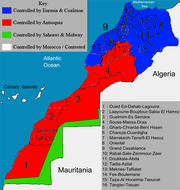| Antioquian-Moroccan war | ||||||||||||
|---|---|---|---|---|---|---|---|---|---|---|---|---|
 Moroccan Spark Squadron escorting F.S. F-15Es | ||||||||||||
| ||||||||||||
| Belligerents | ||||||||||||
| Central Powers: |
The Coalition: |
Sahrawi Alliance: | ||||||||||
| Commanders | ||||||||||||
|
||||||||||||
| Strength | ||||||||||||
130,000+ |
Coalition Forces 800,000+ |
Unknown | ||||||||||
| Casualties and losses | ||||||||||||
| Coalition Forces: 2,320 | ||||||||||||
The Antioquian-Moroccan war started when the Empire of Antioquia launched a surprise invasion of Morocco on 9 September 2012. While Antioquia made a declaration of war, there was no formal cause provided for the hostilities. The first attack came 10 minutes after the declaration was publicly announced with Antioquian military assets being deployed a day earlier on September 8 in anticipation for the planned attack. As Morocco is losing the war, it called on its allies for assistance. The Eurasian Federation, Algeria, and Tunisia rushed in to Morocco's aid on September 11 in a secretive and rather confusing manner under the banner of the Coalition; the Federated States, Pelicania, and China would eventually join the Coalition also. The Union of Midway also intervened in the war by supporting the Sahrawi Arab Democratic Republic (SADR), which was fighting for independence in Western Sahara, creating the Sahrawi Alliance. Russia supported Antioquia and the two formed the Central Powers.
The war ended on 30 September 2012 after weeks of negotiations between the Central Powers and the Coalition starting on September 15; the Moroccan Treaty was finally signed. A separate peace treaty was signed between the Central Powers and the Sahrawi Alliance earlier which resulted to both factions recognizing the SADR and its sovereign rights over its claimed territories; this recognition prompted a similar clause to be included in the Moroccan Treaty.
Antioquian-Moroccan Front[]
Suspicious movements have already been reported ever since a huge Antioquian expeditionary force left its territorial waters. Military analysts already concluded that the likely destination would be somewhere in Northern Africa or in the Mediterranean after conducting reviews of sightings, route patterns, and other data. Moroccan intelligence gave a recommendation to heighten military alertness due to the gathered evidences of the undisclosed deployment coupled with other impending signs such as Antioquian citizens being deported back by their government and scheduled transports between Antioquia and Morocco being suspended weeks before. However it was ignored by the Moroccan government.
On September 9, Antioquian forces began the invasion of Morocco and were quick in establishing beachheads and supply lines. The invasion force also launched strikes on several military installations in Morocco and were able to seize key locations in Western Sahara. The Royal Moroccan Armed Forces were pushed out of Western Sahara within two days only.
Intervention[]

Partition of Morocco on September 12
With Antioquian forces poised to attack mainland Morocco, the Eurasian Federation initially responded by filing a diplomatic protest of the invasion but when it appeared that Antioquia would not withdraw from the besieged country, the AUE decided to "invade" Morocco on September 11 with support from Algeria and Tunisia; these three countries then formed the Coalition although its real organizer is Morocco. The invasion confused international observers and even citizens of Eurasia, Algeria, and Tunisia; some observers thought that the three countries are assisting Antioquia in invading Morocco. Eventually, the three countries revealed that they were contacted by Morocco itself to secretly invade it before Antioquia does and that their "invasion" was staged. The Moroccan monarchy fled to Black Pearl City to avoid assassination attempts.
On September 11 also, the Union of Midway sent troops to defend the Western Sahara which it recognizes as an independent country under the government of the Sahrawi Arab Democratic Republic, bringing it into the war and forming the Sahrawi Alliance.
The [Federated States|Federated States of America]] at first turned down the offer of joining and settled for sending aid to displaced civilians until Antioquia announced that it would be using chemical weapons. The FS then declared war on Antioquia on 12 September 2012 with the United States of Pelicania and the People's Republic of China also announcing their support for the Coalition. The Russian Federation signed a security agreement with Antioquia on September 12, informally pledging support to Antioquia's invasion and forming the Central Powers.
Peace Treaty[]
On September 15, The Eurasian Federation proposed a peace treaty between the Central Powers and the Coalition. The Empire of Antioquia also proposed a peace treaty to the Sahrawi Alliance on the same day. An armistice was informally agreed upon and enforced during the negotiation phase of the war (which lasted for approximately 12 days).
The main argument of the negotiations is regarding the partition of the Coalition and Antioquian-held Moroccan territories on whether it should be uti possidetis or status quo ante bellum. Within the Coalition, the Eurasian Federation was willing to compromise for a uti possidetis wherein Morocco would be divided into the Commonwealth of Morocco, a successor state to the Kingdom of Morocco occupying Coalition-held territories, and the Department of Morocco, an Antioquian-ruled colony occupying territories that the Empire has successfully taken. the FS, a Coalition member, has strongly opposed Eurasia's compromise, calling the Coalition a "joke" and threatening to leave if Eurasia continues to support for it. The Union of Midway was also against Eurasia's compromise and warned that it may lead to an acceptance of conquests and forceful annexations as future consequences.
On September 27, Antioquia accepted the Peace treaty between the Central powers and the Coalition (3rd Eurasian version) which was proposed ten days before on September 17. It was soon agreed upon by all member-states of the Central Powers and the Coalition and adopted as the Moroccan Treaty, a treaty that renders a status quo ante bellum. The Moroccan Treaty became effective on September 30 when all signatories of the belligerents involved have signed it.